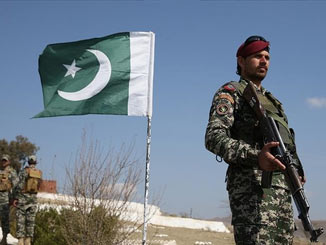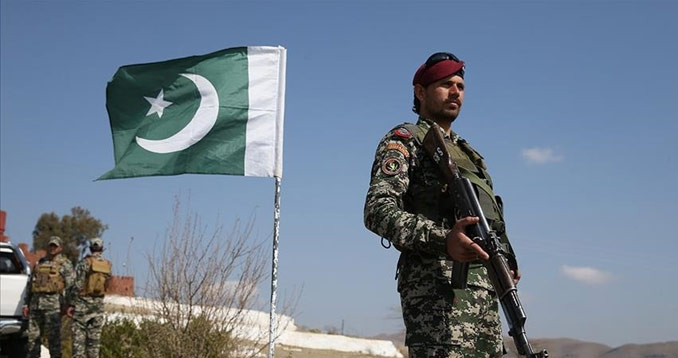

Hasht-E Subh The Army of Pakistan and its leaders have made several attempts to gradually Islamize their forces. After the 1977 revolution, General Zia ul-Haq began Islamizing Pakistan in general and the army in particular.
After Zia became the Chief of the Army Staff in March 1976, he soon changed the Jinnah’s slogan “Faith, unity, and discipline” to “faith, piety, and Jihad in the way of Allah”.
The military training of the Pakistan Armed Forces has always emphasized the principles, teachings, and history of Islam, as well as the record of Muslim military heroes. It seems that these concepts evolved. Such changes can be seen in the views of General Ayub Khan, General Zia ul-Haq, and General Pervez Musharraf.
When General Zia became the chief of army staff, he changed the language of the army and the role of religion in it. He especially sympathized with the Jamaat-e-Islami group and, using his authority, allowed this party to spread its ideas among the forces and other military departments. Zia’s affiliation also allowed other Islamist groups, such as the Tablighi Jamaat (Society of Preachers), to have a greater presence among the army forces (the Tablighi Jamaat is a religious revivalist group that believes in staying away from political activities). Such freedom of action was the red line for the former general commanders of the armed forces of Pakistan. Zia was the first head of government in Pakistan to participate in the annual Tablighi Jamaat meeting in Rawalpindi (in the Punjab province, near Lahore). In doing so, he tried to show his Islamic piety to others. Bhutto, fearing Zia’s leanings toward Jamaat-e-Islami, summoned him to the cabinet to explain his activities.
After being removed from power, Bhutto said during his trial in Pakistan’s Supreme Court: “I appointed someone as the Chief of Army Staff who was a member of Jamaat-e-Islami and that is why I am standing before you now.”
During Zia’s rule, Islamic education became part of the curriculum of “Pakistan Command and Education College”. In his research, Cohen (1984) took a special look at the lectures of Colonel Abdul Qayyum during the 1970s. These lectures were later published in the form of a book with an introduction by Zia himself. Qayyum encouraged the army officers to honor Mullah and Maulvi. In his opinion, these “spiritual” figures – despite their different scientific degrees – can connect an officer’s “faith, profession and western education”. Qayyum also encouraged his students to make the Quran the basis of their teachings.
According to Cohen, the Pakistan Army’s deviation from the conventional military training method of the British Indian era was probably due to greater harmony between militarism and Islamic principles. He was giving an example of distinctive Islamic war slogans in his groups. For example, the motto of Pakistan’s border forces: “I am present in the presence of God the Most Merciful”. Military plaques reminded officers and recruits that “life and death are two sides of the same coin. When the life as an experience ends, the eternal life as we call it, begins.” On other plaques, it was announced that “fighting in the way of God, fighting in the way of truth, is the highest stage of worship and serving in the armed forces is equivalent to a lifetime of worship.”
General Zia took various measures during his mission that had an incalculable impact on the role of Islam in the Army of Pakistan. First, he mobilized conservative Islamist groups to justify and legitimize his challenging rule. At the same time, he tried to popularize religious conservatism in the army. Zia’s government gained public support by spreading an ideology that linked Islam and the country’s destiny with the military of the country. Zia’s plan was based on the initial formulation of Pakistan’s ideology, which emphasized the inherent relationship between Islam and the nation. Hence, he argued that maintaining order and dominant political power under the leadership of the military was necessary to “preserve Islam and Pakistan. Therefore, during Zia’s rule, ‘Islam, Pakistan, and the military regime’ were inseparable in the form of triple invisibility.”
Under Zia’s rule, there were subtle clever changes in the methods of army recruitment. Every passing day, officers were recruited from the middle and lower social and economic classes, as well as from urban areas and small towns, where ideologically conservative Islam prevailed more than in rural areas of Pakistan. Therefore, the values that Zia advocated in the army were not so new to the new Pakistani soldiers.
Zia continued to improve the position of the Maulvis. They should have accompanied the soldiers on the battlefields. Before Zia, Maulvis was a joke both in the army and outside. Mawalvi was someone who completed his religious studies in six years or more in the religious schools; But in reality, few of those who called themselves Maulvi and Mullah had completed the hard courses of religious studies. Many had studied religious studies for a few years and some were barely literate. Traditionally, clerics and mullahs did not receive an official salary but instead supported themselves with cash and non-cash contributions from the people of a place. Maulvis who do not have real knowledge and social status, people see them as charlatans who deserve ridicule and not respect. Rumors about the maulvi’s pederasty have caused people to make up funny stories about them.
During Zia’s time, the display of piety and Islamic commitment affected the promotion of officers; Because from his point of view, faith was “an important part of the private life of army officers and was always under the microscope, but during Zia’s time, an officer’s piety and worship were considered part of his official evaluation and promotion.” This situation encouraged officers to grow beards, and avoid drinking alcohol which was part of the officers’ habit before it was banned by Bhutto.
In addition, an increasing number of military officers and personnel who were sent to the Persian Gulf countries for temporary military missions were influenced by the strict religious teachings (mostly Wahhabi) in those countries.
Very little has been written about Pakistan’s military cooperation with the Persian Gulf states during this period. In 1967, Pakistan and Saudi Arabia signed a formal treaty, whereby Pakistan assumed an official role in the defense of the Saudi monarchy. Pakistani pilots flew Saudi fighter jets during the 1970s. During this period, nearly 15 thousand Pakistani soldiers were present in that country. Of course, Khalid’s story is somewhat different from the story of Lt Gen Faiz Chishti, who played a key role in Zia’s 1977 coup as the commander of the 10th Army Corps in Rawalpindi. According to Chishti, General Zia first announced that due to official cooperation with Saudi Arabia, in 1979, he would send Pakistani troops to that country. Zia passionately said that the Saudis would give a good reward in return. Chishti claims that he strongly protested against Zia’s decision and said: “We are not a mercenary army… If these forces are sent to Saudi Arabia, the Pakistan Army will be destroyed in the long run.” Chishti believed that serving in Saudi Arabia was “absolutely detrimental to the Pakistan Army. The interests and financial benefits of serving in that country would cause jealousy among the forces, the interest in continuing military service after the end of duty in Saudi Arabia will increase, and it increases Shia and Sunni tensions (in the army).”
Pakistan Army’s various efforts to spread Islamism among the armed forces have been fruitful. Stephen Cohen (1984), who conducted his field research in the late 1970s and early 1980s, quotes a senior military official: “Expressions such as ‘Pakistan ideology’ and ‘Islamic glory’, which are usually not part of the professional vocabulary of a military person, it has become a common phrase… the heads of military departments talk more like etymologist than a soldier.”
The growing effects of General Zia-ul-Haq’s policies have been the rise of hardline Islamism among the Pakistani armed forces. For this small group of soldiers, ideology has led to extremism and has overcome specialization. If their views are not countered, they will destroy the foundation of a cohesive, professionally capable, and technologically superior armed force in Pakistan.”
Most likely, the change in customs and military thinking during Zia’s era must have had an impact on the recruitment of army corps officers and soldiers of the Pakistan Army. People who rejected Zia’s point of view or didn’t want to pretend to accept it, maybe they couldn’t have entered Pakistan’s army from the very beginning. Therefore, the spread of Islamism from top to bottom was carried out by the leadership of the army and also through recruitment pressures, some of whom may have been dissuaded from joining the officer corps because of their particularities and views. Needless to say, no data are currently available to investigate the above possibilities.
Therefore, by the end of the 21st century, the military of Pakistan will face major challenges of the millennium.
First, considering the placement of a new generation of officers in commanding positions who entered the army during Zia’s era, it is necessary to ensure the state of professional orientation and cohesion in the armed forces. Second, with the continued influences of Muslim and Islamist groups in this country, a delicate balance between belief in Islam and professional discipline must be ensured. There is no doubt that Pakistan’s active use of Islamist groups as a foreign policy tool is comforting to some in the military who find it difficult to turn their backs on jihad.

Leave a Reply